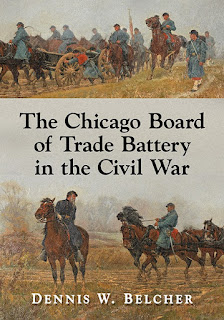[The Chicago Board of Trade Battery in the Civil War by Dennis W. Belcher (McFarland, 2022). Softcover, maps, photos, appendices, notes, bibliography, index. Pages main/total:ix,293/389. ISBN:978-1-4766-8391-1. $49.95]
In response to the Lincoln administration's urgent July 1862 call for more volunteers to bolster the Union war effort, the directors of the Chicago Board of Trade sponsored the formation of a new artillery battery. Its ranks were immediately filled with young men employed as clerks by the many Chicago businesses the board was created to promote. The Chicago Board of Trade Independent Light Artillery would go on to earn an enviable reputation across a host of western battlefields. Exhaustive in its detail, Dennis Belcher's The Chicago Board of Trade Battery in the Civil War is the first full-length history of this celebrated artillery company.
In Civil War unit history publishing, battery studies are orders of magnitude less common than infantry and cavalry regimental studies. Based simply on its relative size, an artillery company's potential pool of letter, journal, and memoir source material will always be far smaller than that of any infantry or cavalry regiment. Fortunately for Belcher, more than a dozen Board of Trade battery veterans left behind writings for him to use, four of them quite extensive. Very prominent in aiding the author's day by day tracing of the battery's war service were the Nourse brothers letters, diary, and journal. Their writings were critical to the authoring of an invaluable 1902 sketch history of the unit. The eighty surviving letters of John Fleming proved equally useful. Readers will encounter these names early and often in Belcher's text. While those source materials made Belcher's job much easier, other circumstances conspired to complicate his task. For example, official unit records of the kinds typically housed in the National Archives are very incomplete for this battery, and the Great Chicago Fire destroyed many other sources. The author's successful navigation of those challenges is one of this volume's finest achievements.
By Belcher's own count, the Chicago Board of Trade Battery fought in eleven major battles, twenty-six minor battles, and forty-two skirmishes, and it seems like every one is described at some length in this unit history tome! These events include action from the Stones River, Chickamauga, Atlanta, and Nashville campaigns along with numerous cavalry raids of various scales and consequences. The battery's extensive service across the western theater was capped off in early 1865 with a prominent role in Wilson's Raid.
As a support arm rather than maneuver element, the battlefield impact of a single battery during any major engagement can be difficult to assess. However, the narrative method employed by Belcher goes a long way toward exposing standout elements of the Board of Trade Battery's service. By providing extensive context in the form of highly detailed battlefield accounts of the activities of higher order units (ex. regiments, brigades, and divisions) the battery fought both with and against, Belcher offers readers a clear and full picture of what was going on around the Board of Trade Battery when it was engaged and, even more important, a very strong sense of where the battery's interventions might have played an significant role in the outcomes of those actions.
The Stones River National Battlefield markers and tour prominently promote the Board of Trade battery's role in bolstering the Union center during the darkest moments of that battle's first day of fighting, and more casual students can be forgiven for thinking that the battery primarily served infantry during the war. However, just months later the battery was converted to horse artillery and served in that cavalry support capacity for the duration of the conflict. As the field's most prominent current historian of the Union cavalry attached to the Army of the Cumberland, Belcher is uniquely positioned to document the Chicago Board of Trade Battery's inextricable links to the western mounted arm's evolution and fighting performance across a vast host of battles, raids, and skirmishes.
Belcher is an author who consistently recognizes that original maps form an essential part of any effective military study, and the follow through on that belief is equally consistent. The full-page operational and tactical-scale cartography commissioned for this battery history excels equally in providing big picture information and in pinpointing the position of the battery itself in the midst of the action on numerous battlefields. More supplementary data and information are placed in the appendix section, where readers can find a detailed battery roster and unit casualty table.
Effectively exploiting existing sources specifically associated with the Chicago Board of Trade Battery while also expertly leveraging outside resources to fill in gaps and address limitations, Dennis Belcher has crafted one of the more impressive Civil War battery histories of recent memory. While the volume might appeal most to artillery researchers and enthusiasts, its exhaustive coverage of the Chicago Board of Trade Battery's central partnership with the Union Army's mounted forces of the western theater should also render it essential reading to all serious Civil War cavalry students.



My Great Grandfather, John Lee Bancroft, was a soldier in the Chicago Board & Trade civil war battery. He came to America from Oldham, England and he married a woman from Berlin,Germany and raised a large family in Chicago after the War. He died at age 60 in 1901 and he’s buried in Rosehill cemetery in a grave not far from the Statue commemorating the Chicago Board & Trade Battery.
ReplyDeleteMy name is Brian J. Bancroft, Great Grandson of John Lee Bancroft who served in Chicago Board and Trade Civil War battery. bbb2365@hotmail.com
Delete